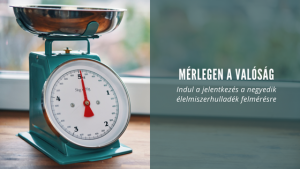Serious question: do you know how much you waste?
The National Food Chain Safety Office (Nébih) is waiting for applications from households for its fourth food waste assessment. Since 2016, the office has been monitoring the development of the domestic food waste situation, which is not only important due to the data provision obligation of the member states of the European Union, but also sets the direction in the field of food waste prevention by mapping the most problematic areas.

According to experience, reducing food waste depends on sometimes taking stock of our everyday shopping, food preparation, serving and food storage habits. In most cases, we can save several kilograms of food waste per year even with small modifications. The very first step we can take to reduce food waste is to identify the weak points in our household. A good way to do this is to keep a waste log for a week, which records what and how much went into the garbage. Taking part in Nébih’s latest survey is an excellent opportunity for this. The participants get an idea of which foods are thrown away the most, and they can take targeted action to reduce waste in the future. For this, you can find many practices and information on the website of the program “Without Remaining”, as well as on Facebook and Instagram.
According to recent research by Nébih, an average Hungarian citizen “produces” 65 kg of food waste per year, a significant part of which (more than 25 kg) could be avoided with a little care
We call this part food waste, which has decreased by 25% in Hungarian households in the last 5 years. Despite the reduction, waste still amounts to 245,000 tons per year, with which 450,000 people could live well for a year, assuming three generous meals a day. On the occasion of World Food Day, which is held every year on October 16, the office would like to draw attention to the fact that food is a value, and preventing its waste is not only an environmental and economic issue, but also a moral one. You can apply for participation in the household food waste measurement program on the website of the No Leftovers program in the next two weeks. The office thanks the participants for their help with a gift package.
Related news
The presence of bird flu has also been confirmed in Bács-Kiskun County
🎧 Hallgasd a cikket: Lejátszás Szünet Folytatás Leállítás Nyelv: Auto…
Read more >Related news
40 secure jobs, sustainable solutions – new BURGER KING® in Csepel
🎧 Hallgasd a cikket: Lejátszás Szünet Folytatás Leállítás Nyelv: Auto…
Read more >(HU) METRO Gasztro Fesztivál a SIRHA Budapesten – Élmény, inspiráció és valódi megoldások a HoReCa-szakmának
🎧 Hallgasd a cikket: Lejátszás Szünet Folytatás Leállítás Nyelv: Auto…
Read more >








